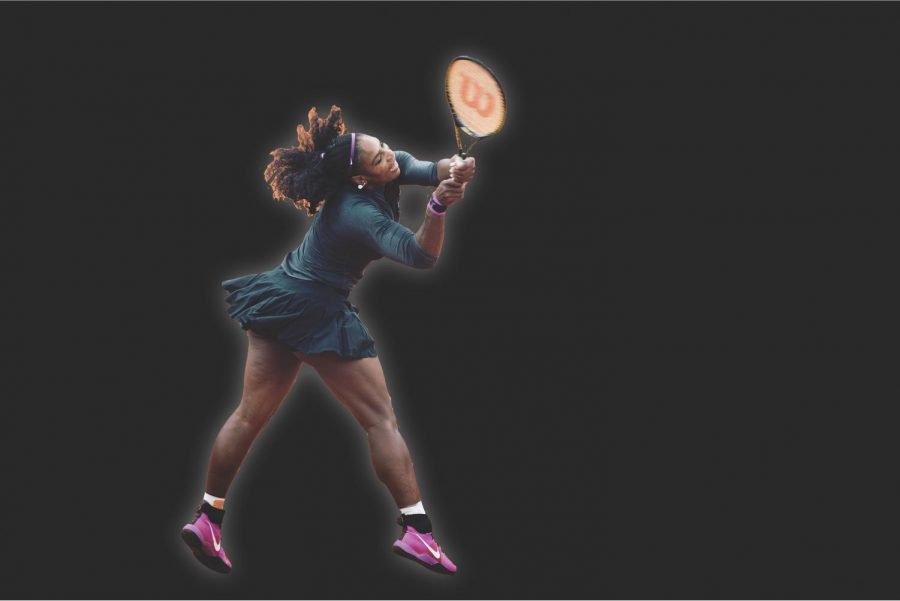Tennis Tension
Serena Williams’ career has been riddled with controversy. She was thrust into the spotlight once again as the director of the French Open publicly announced that she would not be allowed to wear her black catsuit in next year’s tournament.
December 3, 2018
As Serena Williams comes off the court in her flamboyant, black panther-esque outfit, she is unaware of the controversy that would inevitably ensue. Williams’ outfit, a design solely meant to maintain her health after struggling to give birth to her first child, has sparked a debate about the traditionalism in tennis. With the likes of racism, sexism, and overall stubbornness for change in a traditional sport like tennis, Williams has caused more discussion and argument than she would’ve thought imaginable from something as minor and seemingly insignificant as her clothing choice.
The controversy started nine months before the French Open, when French Open Administrator Bernard Giudicelli said he would not allow Williams’ catsuit in the tournament. Many agreed with Giudicelli that traditional white skirts should be worn, especially in an event as historic as the French Open. However, others are not only concerned with the sexism associated with a dress code, but also with Williams’ health. After blood clotting during and after the birth of her child almost a year ago, Williams’ doctors recommended that she wear a tightly-knit suit in order to keep her blood circulation flowing. The reasoning behind Williams’ wardrobe was strictly for health conditions, and not to make some sort of statement.
Giudicelli, in his official released statement, said “…we are going to nonetheless ask the manufacturers to let us know what [outfits are] coming. I believe we have sometimes gone too far. Serena’s outfit this year, for example, would no longer be accepted. You have to respect the game and the place.”
Many still did not agree that Williams’ attire was disrespectful to the sport and started to analyze Giudicelli’s meaning. Many people took the decision as potentially racist and sexist, given tennis has been a white-dominated sport ever since its invention in the UK during the 19th century. Meanwhile, Williams has been one of the most dominant players in history, as a black woman. Many people believe Guidicelli’s verdict is associated with the dominance and attention Williams has attained as a black female, despite Giudicelli’s reputation as a respected executive with the French Open.
Giudicelli later stated that they are in the process of creating an official dress-code for the French Open to avoid similar situations in the future.
The controversy is reminiscent of a similar situation in the eighties when professional tennis player Anne White showed up to Wimbledon in a white catsuit. She was told she had to change or else she would not be allowed to continue in the tournament. Like Williams, White stated that the suit was more functional than a fashion statement. While he situation was dealt with similarly by the tournament, the public responses were quite different.
Publicly, White was applauded for her outfit choice and commentators even said that “while the average woman could not get away with wearing the bodysuit, White’s long and lean body made her the exception.”
When Serena first wore a short catsuit in 2002 at the US Open, she did not receive the same type of response. Instead of people describing her as an “enviable example of femininity”, as was White in 1985, she was criticized. According to Jamie Schultz’s essay Reading the Catsuit, which was published in the Journal of Sport and Social Issue, her outfit was described as “ultra-risque,” “curve-clutching,” and “leaving little to the imagination.” Other publications pointed to her “bulging muscles” and “defensive-back physique.” Even a Washington Post fashion critic, Robin Givhan, described her as “a working girl of a different sort,” and described the catsuit as “trashy.”
However, Williams is not new to this type of criticism: she has faced it her whole career. She recently ended a 14-year boycott she held against the Indian Wells Tournament that began after she and her sister faced extreme discrimination and racial slurs yelled from the crowd at the tournament. Since then, she has continued to face discrimination from the press, spectators and other players.
Though, she may have received much backlash for wearing the catsuit, some have come out and stated their support for her.
Nike responded by featuring her in an advertisement with a picture of her in the catsuit with the words, “You can take the superhero out of her costume, but you can never take away her super powers.”
Female sports legend and Title IX advocate ever since her days as a player, Billie Jean King had strong opinions on Williams’ situation.
“You can see how things are changing in the world for us: our freedoms, the way we dress, which is good,” King said. “But I never hear them really talk about how the guys should dress”.
Sexism has been evident in the sport of tennis since its origins. Popularity of tennis first spread in Victorian England, where wearing white became customary as it was associated with wealth and privilege. However, the outfits of the women tennis players prevented them from much movement at all as they wore their street clothes which included corsets, bustles, petticoats and gigantic skirts. According to Allure Magazine, in the 1900’s, the women wore “floor-length skirts, stockings, and long-sleeved tops” while playing. As the tennis skirt lengths shortened to allow more movement, in the early 20th century, controversy ensued.
Outside of fashion, there has also been some sexist moments in tennis’ history. Former tennis champion, Raymond Moore, has been quoted saying that female tennis stars “ride on the coattails of the men” and that they should “go down every night” on their “knees and thank god that Roger Federer and Rafa Nadal were born, because they have carried this sport.” Once the number one ranked male player, Novak Djokovic stated after a win at the Indian Wells tournament that male tennis players should earn more prize money than their women counterparts because their matches have more viewers. He also said that he has respect for female athletes who face added challenges such as “the hormones and different stuff.”
All in all, Serena Williams’ entire career has centered around starting controversy and ending discrimination, and her outfit dispute with the French Open management has only continued this reputation.











